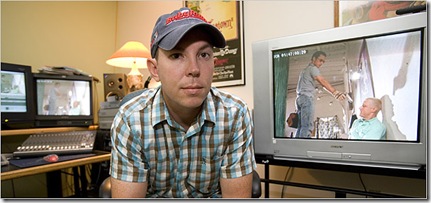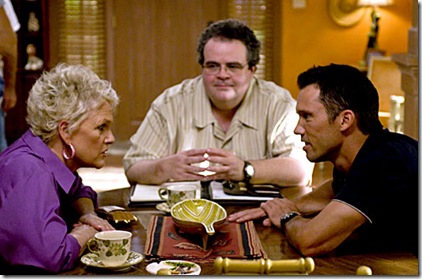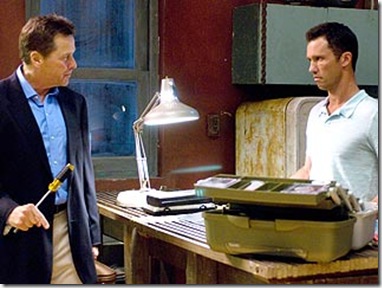Burn Notice [USA, Thursdays, 10/9C] has, over the course of its first three seasons, become one of cable’s most consistent hits. Recently, I had the opportunity to tale part in a Q&A teleconference call with series creator Matt Nix. As usual, Nix was cheerful, charming and loquacious – though [also as usual] shy on the spoiler front.
Also taking part in the Q&A were: Emma Loggins, Jenny Rarden, Melissa Lowry, Troy Rogers, Saran Fulghum and Len Lamoray [no affiliations were given].
I just had a quick question for your guys about Comic-Con. I know that was so successful last year with the shows first appearance there. Are you guys planning to do anything there this year?
Matt Nix: We would love to. It was a blast and any opportunity to be on stage at Comic-Con with Bruce Campbell is— I know he screams for me like that so there’s lots of fun.
So you guys don’t have any plans yet but you’re open to it?
Nix: Yes, I’d say more than open to it. It really though is just the logistics of getting people from Miami to Comic-Con are just kind of ridiculous. People often ask about, why don’t people do more talk shows and things like that and they sort of forget that well, most actors are either in New York or Los Angeles where talk shows shoot similarly when we’re shooting. Things like Comic-Con are just logistically tough, but we love doing them.
And could you also talk upcoming guest stars that you have lined up?
Nix: Oh. Please bear in mind as I answer these questions that we were shooting these things a while ago so I just need to do a little review and try to remember what have you guys seen and what have you not seen.
Well certainly in the finale, we have Garret Dillahunt coming and doing a pretty amazing bad guy. Let’s see, the guy who played Tony Almeida on 24. I’m completely blanking on his name. In any case, he is in the episode after this week’s episode and he is playing a bad guy who Fiona has a real connection to. Oh sorry, Carlos Bernard, yes playing a bad guy who is really sort of only removed from the characters on the show by— under other circumstances he could have been one of the team, but he is willing to do certain things that they’re not willing to do and that’s a divide that they just can’t cross. But he’s a guy who’s really committed to what he’s doing, really cares about what he’s doing. It’s a pretty devastating performance. He’s pretty awesome. I’d say Garret and Carlos Bernard are the ones that are upcoming that really jump out at me right now.
Do you guys get a lot of fans that tell you they want Michael and Fiona together romantically because this season there’s been a definite hints both subtle and not so subtle in that direction. Do fan wishes have anything to do with that or was that something you’d been planning all along?
Nix: It’s certainly important to us that that’s something that fans respond to. One of the things that we’re interested in in that relationship I’m particularly interested in is just the idea that in life, people have complex relationships that remain unresolved all the time. That’s a really common experience. That there are people that you can care for deeply and be romantically involved in who for one reason or another, having a conventional relationship with them, no matter how much you might want it, is extremely problematic.
What’s emerged for us is that Michael and Fiona are two people who have a really hard time being with other people and at this point, there’s no question that they’ve acknowledged how much they care about each other. They’re not really built for stable romantic connections. So really what we’re playing with is the idea that they have this unstable romantic connection. That it’s something that they can’t really settle into and they can’t leave alone.
It’s something that comes up a lot when people talk about relationships on television. It’s always the Sam and Diane model, which is that there’s romantic tension between two people and then that romantic tension gets released and then it’s all over, right. We’re sort of doing the exact opposite of that, which is nothing get released. When people get together, it is not necessarily true that suddenly everything becomes simpler. Often times everything becomes more complicated.
Sam and Maddy have a unique kind of chemistry and relationship. He seems to have more patience with her than Michael does. Are there any plans for them to have any sort of romantic relationship or is it more just a mother and son or friends type only?
Nix: I can absolutely promise you that Sam and Madeline will never have a romantic relationship. That is creepy and wrong and we would never go there. That said, it isn’t really something that I sat down and planned, but it is something that emerged out of seeing the actors together on the screen and just realizing that certainly Sam is kind of Madeline’s best friend.
In a roundabout way, Madeline is Sam’s best friend. Michael is Sam’s best friend mostly, but when it comes to a certain kind of stable, like count-on able friendship that doesn’t have all of the baggage that comes along with being friends with Michael, it’s really all about Madeline and exploring that relationship. I think we really only just go to the point; no it happened in Season Two and certainly in the first half of Season Three where we got to the point where they’re the kinds of friends who could have a fight and then reconcile. It’s sort of emerged to be one of the more complex and interesting relationships for us to explore. It’s not something that you see a lot like an adult man’s friendship with his best friend’s mother, but it works for us.
First an observation. I don’t know if anyone’s mentioned this before, but Chris Vance looks an awful lot like Dougray Scott. That wouldn’t have had anything to do with his casting by any chance?
Nix: Actually, no. I literally just imdb’ed Dougray Scott to see what you meant. Of course, you’re right. No actually, Chris Vance is somebody that – he was the star of Mental and Mental was made by the same studio as Burn Notice. So they all spoke glowingly of him. He’s a terrific guy and a lot of fun to work with. When we’re doing those arcs, it’s usually not an audition process and if it is, it’s sort of a high level audition process, but we like to be able to have conversations with people and know that this is somebody who has a lot of range, can play with things, can have fun with the role and is someone that we really want to work with. Chris was somebody who just hit all those marks for us and we’re really excited to get him. But no, it certainly is not true that we sat down and said let’s find someone that looks like Dougray Scott.
Also, following up on that… Gilroy. He seems like the kind of character that could go for more than just one season because he’s at least as intelligent as Michael though he has this blind spot where maybe he’s a bit too sure of himself. I was wondering if he’s going to be around for a while or do you have someone even more diabolical lined up to bring the pain to Michael?
Nix: Well, I don’t want to give too much away but I’d expect option two. The fun thing actually about Gilroy’s character is this sort of snuck up on us in the execution. He’s a really, really bad guy and it’s fairly clear he has a sort of flirty energy with Michael. I guess what’s fun about him for us is he never stops being a bad guy and his relationship with Michael in the penultimate episode takes a really unexpected turn. It’s actually one of our more touching moments in the season, but we didn’t think of it that way, it just sort of worked out that way. So he’s a villain who over the course of his arc comes to have an odd affection for Michael.
… in “A Dark Road,” the episode with Tyne Daly, who is awesome by the way, we see Michael arguing with Madeline that he helps people when he’s describing what he does for a living and he repeats that a couple of times during the course of the episode. So what we’re wondering is, is Michael going to be able to settle with this kind of living as opposed to working as a spy where you follow orders for kind of unknown reasons?
Nix: That’s a really good question. You kind of have to work backwards in a way like you’re making a television show but like, why does Michael help people every week. You obviously don’t get to say he helps people every week because he’s aware that he’s on a television program and that the television program needs a story every week. So you really have to think well, what kind of person really does this?
When I think about it, Michael has been kind of coming to terms over the course of the last three seasons with the fact that there is a part of him that has to do this, and that if you look at the first season, he tends to take this attitude of this very reluctant hero. He doesn’t want to take cases but he does. That’s sort of evolved at this point because in our conception of the character and I think, if I can talk about him like he’s a real guy, in Michael’s mind he has come to realize he is self aware enough to know yeah, there is a reason I do this every week and it’s related to why he got involved in the spy business in the first place. He’s doing dark deeds for a noble purpose and that’s kind of the gig and just because he lost his job doesn’t mean he stops doing that and he is sort of a guy who is willing to use the dark to save the light. That’s sort of a pretentious thing to say but it’s true.
So, that’s something that, in dealing with Madeline, part of it is her confronting him with the damage that he sometimes does with the reality of the fact that he’s a guy who decides what’s best for people and then just goes out and does it. Michael basically having to confront the fact that that’s who he is; he does this and he doesn’t really feel like he has a choice and you kind of got to take him or leave him. And ultimately, as is the case in the end of that episode, he is willing to really put his own … on the line for the sake of these other people. It’s not an easy thing for him to do and it certainly comes at great cost. You kind of think he’s not a very demonstrative guy and that’s how he cares about people.
I wanted to know, at this point in the series, how necessary is the original arc because Michael already knows who burned him?
Nix: Well, I think it sort of depends on what you consider the original arc to be. I think that really, he kind of knew who burned him, in a roundabout way, in the middle of season one. So the question of who burned me is no longer the central question for him. It’s really more, what do I do about it?
If the first season was who burned me, the second season is what do the people who burned me want with me? The third season is can I get unburned and if so, at what cost? So, we’re kind of examining that question from different angles. I think people do sometimes look at the show and think, and I understand why, they’ll talk like we’re still asking the question who burned Michael, when in fact, it’s not really a question that he’s asked since season one precisely.
So, I think that there is something to Michael having an ongoing investigation into matters related to his circumstances for a lot of reasons. But no, as far as the who burned Michael Weston, there may be more to explore with regard to that question at some point, but it’s not sort of what we’re spending our time on at this point. And, indeed, by the end of this season, we answer a very big question about Michael’s burning, as you will see. It’s not necessarily the question that people would have thought to ask, although I think that it is a very interesting question to ask, but it is not who burned me.
I always enjoy seeing Tim Matheson showing up as Crazy Larry. I wanted to know, how much will he factor into the series in future episodes?
Nix: Well as a director, certainly we love Larry. I think that one of the things that we’re conscience of in working with characters like Larry and Jay Karnes’ character, Brennan would be another example of this, the Michael mirror characters, the guys who are really in significant ways operating on Michael’s level, and whose primary focus is on Michael, as opposed to some – I mean that wasn’t true actually of Brennan’s first appearance but it was true of the second. Those characters whose primary focus is on Michael, you just can’t do that every week. In the writer’s room, we always joke that Dr. House can’t operate on himself every episode. Those are special episodes and you love them, but you can’t do them every week.
So, the answer is yes, Larry will factor into the series in season four. We haven’t exactly figured out how but we have a basic idea and we love him. He loves Michael. Part of what’s fun about Larry for us is that he’s a guy who’s primarily motivated by his love of Michael, which is a really odd thing for a bad guy. He’s sort of like I love money and I love killing people, but mostly, kid, I love you, let’s just hang out.
Does he love matching wits with him? Is that what it is?
Nix: I think he loves matching wits with him. I think at a really deep level one of the things that we look at in the series is the idea that this job is really lonely. If you’re Michael, you don’t get to go to spy conventions and talk to other people who do what you do. It’s a profoundly lonely gig. Michael gets to hang out with people who are reflections of himself in a certain way. Sam has certain skills that Michael has. Fiona has certain skills that Michael has. They both have inclinations and a world view that is not precisely Michaels. But Larry looks at Michael and says, there’s the one true friend that I ever had, there’s the one guy who really understands me and yes, he thinks I’m a psychopath and he sort of hates me, but he gets me, man. That’s worth something. That’s what makes him so much fun to write. It’s just not something you get to do a whole lot, a guy who’s sort of arrogant but he wants to be Michael’s Dad.
Where do you get the spy tips in the show?
Nix: Our primary source is the consulting producer on the show, Michael Wilson, who worked in intelligence and sort of around these things over the course of his career and can give us a lot of stuff. We also read a lot of books and source material and stuff like that. We even talk to law enforcement.
In a roundabout way, we end up drawing on any arena where you can find interesting technique related to deception. We’ve gotten things from undercover narcotics officers. We’ve gotten things from the ATF. We’ve gotten things from folks at the actual CIA, all over the place and reading tons of books. Foreign intelligence agencies tend to be really useful, so histories of particularly the intelligence agencies like the KGB or the Mossad or the agencies that do the more hardcore, devious stuff and certainly the Soviet Union don’t have to worry about a judiciary that’s going to come down really hard on them so the pallet is a little bid broader. I’d say on a day to day basis, we talk to Michael Wilson a lot but we also do a lot of other research.
Wow, that’s a lot of effort that goes into it.
Nix: Yes, absolutely. I think it’s sort of, you know, we’re doing these voiceovers and the last thing we want is to be showcasing technique that isn’t true. It seems like sort of a cheat.
Thinking back to the creation of the show, were there any difficulties in getting the script from just an idea to the hit TV series it is now?
Nix: No. I am joking of course. Yes, I think every phase has it’s challenges. Really, I’d never worked in television at all before, so I wrote the pilot of Burn Notice and it’s funny to me now, the first writer I hired was my friend, Alfredo Barrios who’s been a writer on the show for the full run of the series and he was really the first guy who sat me down and said well, you got away with writing a pilot that had no act outs, but let me teach you what an act out is and I said oh, interesting. Terrific. So, something exciting should happen before the commercial. Good to know. I’d been working in movies for years and so I just didn’t think about it.
So, there was certainly a fair amount of learning the form, evolving what the series was. The original conception of the series was a much darker show and it became a lighter show for USA, so that was another aspect of it. But then just kind of working out what are the values of the show, what’s the kind of mass of an episode because people use the term formula like it’s a bad thing. Ultimately it’s a well worked out formula that makes the show work. The shows that go for a long time and people really care about are shows that have formulas that are concrete enough that they know what they’re sitting down to watch. They know what the show is and flexible enough that they can still be surprised every week. So, working that stuff out is an ongoing challenge and it never really gets any easier.
As Burn Notice progresses, does it get easier to write the episodes since you now have established characters or more difficult since they have already done so much?
Nix: I’d say both. Certain aspects of the series get easier because we don’t have to have a long debate about what Sam’s basic world view is. We know more about the characters, so those things are easier. At the same time, you don’t want to repeat yourself and really I think you want to find new ways that the interaction with the sort of A stories. It’s really important to us that those not be or it’s really important to me anyway, that that interaction not be mechanical.
Ideally, every episode is demanding something of Michael as a person. Pursuing the case of the weak is not simply a matter of rearranging pieces on a board and making sure that the client wins. It also challenges Michael and it challenges the other characters to dig deep and discover things about themselves, discover things about each other that they didn’t know before.
One of the opportunities now that the show has established, and people understand that these people fundamentally care about each other, is we have the opportunity the put them in more conflict. We can do an episode now where people really violently disagree about how to pursue a particular problem and whereas if we had done that in the first season, people might have been confused as to what the relationships between the characters were. But, now we can get away with it a lot more easily because people understand those things.
Another thing that we’re exploring is episode 15 of this year, the episode before the finale, that’s an episode where the person taking the lead on the case is really Fiona. It’s not fundamentally Michael’s case. Michael is hugely involved and it’s a big deal for him, but that’s a whole new arena for us to explore. It’s a big challenge for Michael when Fiona’s going into stuff and doing things alone and facing her own challenges as a person and he’s just got to be kind of sidelined and do whatever he can to protect her, but knowing that, ultimately, she is going to have to save the day in a Fiona way and he has got to stand on the sidelines and know that he might solve this differently but he’s not the guy on the ground, and that’s another really interesting thing for us.



